Just as the saraph serpent was lifted up on a pole in the desert for the people to see, and thus live, so the Son of Man, Jesus Christ, was lifted up on the cross for the salvation of the world. In these late Lenten days, as we look upon the cross, either here in church or in our homes, our hearts surely must be stirred to remember the painful price our Lord paid for our salvation. With hearts filled with gratitude, we come to this Eucharist, with our eyes fixed on our Lord lifted up for us, who pours himself out for us again and still. When we see him lifted up, we remember that he is “I AM,” our crucified and risen Lord, and whenever we look to him, we are saved from all that ails us, from our sins and brokenness, and we ourselves are lifted up to eternal life.
Category: The Church Year
-

Monday of the Fifth Week of Lent
Today’s readings Susanna’s story is one of the most eloquent in the Old Testament Scriptures: in it we see the wisdom of the prophet Daniel, as well as the mercy and justice of God. Her story is certainly echoed in our Gospel reading about the acquittal of the woman caught in adultery, although Susanna was actually innocent. In the Gospel reading, we are treated to the wisdom of Jesus, brought about as it is with the mercy and justice of God. But sadly, we see in both stories also the fickleness of the human heart and the evil and treachery that makes up some of our darker moments.
To those who seek to pervert justice and to collude with others against some other person, these readings expose those evil thoughts and flood the darkness with the piercing light of God’s justice. No one has a right to judge others when their own intentions are not pure. Only God can give real justice, just as only God brings ultimate mercy.
To those who are the victims of oppression, these readings give hope that God in his mercy will always walk with those who walk through the dark valley, and give to the downtrodden the salvation which they seek. God is ultimately very interested in the kind of justice that is characterized by right relationships with one another and with Him. It is the desire of God’s heart that this kind of justice would be tempered with mercy and would go out and lighten all the dark places of the earth.
Today we are called upon to right wrongs, to be completely honest and forthright in our dealings with others, to seek to purify our hearts of any wicked intent, and most of all to seek to restore right relationships with any person who has something against us, or against whom we have something. Our prayer this day is that God’s mercy and justice would reign, and that God’s kingdom would come about in all its fullness.
-
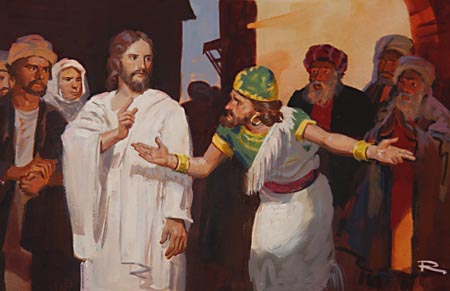
Monday of the Fourth Week of Lent
At the heart of our practice of prayer has to be trust in God. We don’t – or shouldn’t – need signs to convince us of God’s love and care for us. But don’t we do that all the time? Aren’t we just like those Galileans looking for a sign? We might be hesitant to take a leap of faith that we know God is calling us to make, but are looking for some kind of miracle to get us off our behinds. We might know that healing in a certain situation will take some time, but we want God to descend, wave a magic wand, and make it all go away.
But just as the royal official trusted that Jesus could cure his son, so we too need to trust that God in his goodness will work the best for us, in his time, in his way. Isaiah tells us today that God is about to create a new heavens and a new earth, where there will always be rejoicing and gladness. But how hard is it for us to wait for that new creative act, isn’t it? We just really want to see that big picture now, please, we want to know what’s on God’s mind and where he’s taking us. But that’s not how God works is it?
It can be hard for us when we look around for blessing and don’t see it happening on our timetable. We forget, sometimes, that a big part of the grace comes in the journey, even when things are really painful. The Psalmist says, “O LORD, you brought me up from the nether world; you preserved me from among those going down into the pit.” Notice how he does not say that God shielded him from going to the nether world. But the nether world was not the end of the Psalmist’s story.
We don’t know where God is taking us today – or any day, for that matter. We have to trust in our God who longs for our good, just like that royal official. And we have to believe in the power of God to raise us up, just as he raised his Son from the dead. We all long to celebrate our Easter Sundays, but our faith tells us that we have to get through our Good Fridays first.
Feel free to remind me of this homily on my next Good Friday.
-

Thursday of the Second Week of Lent
The great sin of the rich man may not have been the sin of neglecting poor Lazarus, although that was certainly bad. His greatest sin, I think, was that he trusted in himself instead of in God. He had everything he needed in life, because he was able to trust in himself to get it. But he never had a relationship with God. You don’t see him praying in the story or even giving thanks to God for his riches. All you see is him enjoying what he has amassed, to the neglect of the poor.
Now in death, he wants the good things God will provide for those who trust in him, people like Lazarus for example. Lazarus has suffered much, and as the Old Testament Prophets proclaim, God is especially close to the poor and needy. But the rich man has already made his choice, and unfortunately now, trusting in himself doesn’t bring him anything good.
So the question is, in whom do we trust? Blessed are they, the Psalmist says today, who hope in the Lord.
-
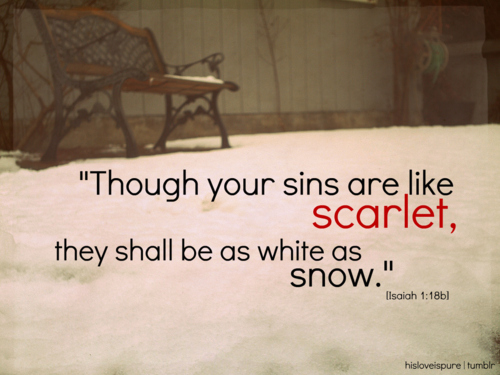
Tuesday of the Second Week of Lent
Many people who have been away from the Sacrament of Penance for a long time have said that they were afraid to come back to the Church because they felt like their sins defined them. That they walked around with some kind of scarlet letter on their persons. I think this is the experience that Isaiah is getting at when he says, “Though your sins be like scarlet, they may become white as snow; Though they be crimson red, they may become white as wool.”
Our sins do not define us, but our repentance does. And that repentance has to include a commitment to justice for those we have marginalized: “redress the wronged, hear the orphan’s plea, defend the widow.” Our penance and our righteousness has to be approached in humility, remembering that those who humble themselves will be exalted. Our repentance has its reward, as the Psalmist tells us: “To the upright I will show the saving power of God.”
-
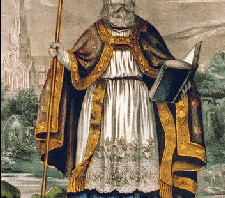
Saint Patrick, Bishop
I used to be upset that Saint Patrick’s Day always happened during Lent. I’d have to postpone the celebration of my favorite saint until Sunday, especially if it fell on a Friday, because we just didn’t have corned beef on Friday, you know. But as I’ve grown older, I appreciate that Saint Patrick’s Day is in Lent, because I think Saint Patrick is a compelling Lenten figure.
Lent, of course, is a time of conversion and renewal of faith. Saint Patrick’s life was one of conversion. Listen to these words from the beginning of his famous Confession: “And there the Lord opened my mind to an awareness of my unbelief, in order that, even so late, I might remember my transgressions and turn with all my heart to the Lord my God, who had regard for my insignificance and pitied my youth and ignorance. And he watched over me before I knew him, and before I learned sense or even distinguished between good and evil, and he protected me, and consoled me as a father would his son.”
And so we have here a rather compelling story of conversion. We who are sinners ourselves might well relate to his reminiscences of a disaffected youth. He writes, in his famous Confession of an unmentioned sin, dating from before he was ordained, even before he was living a Christian life. The sin was apparently known to a friend of his – a friend who lobbied for him to become a bishop, and then later betrayed him to his superiors. Patrick has long since moved on from where he was at the time this sin was committed, he is an older man now, looking back on youthful indiscretions, and not bearing any ill-will toward those who would rub his nose in it, he thanks God for the strength he has since gained: “So I give thanks to the one who cared for me in all my difficulties, because he allowed me to continue in my chosen mission and the work that Christ my master taught me. More and more I have felt inside myself a great strength because my faith was proven right before God and the whole world.”
So many of us can look back on the sins and indiscretions of our youth too. That Patrick could do it with gratitude in his heart for the strength God had given him, and for a second chance to live his life the right way, is an example for all of us, a grace that we could all long for especially in these Lenten days.
St. Patrick had to weather so many storms in his life. He was kidnapped and enslaved, he worked in mission territory among people who at times were hostile to the Christian way of life, he was betrayed by a friend and besieged by fellow clergymen who were jealous of the success of his ministry and critical of the way he did it. But through it all, he was grateful for the power of God at work in him. The faith that led him to be that way was nourished on a strong friendship with God.
Some say St. Patrick never wrote his famous “Breastplate” or “Lorica” prayer. Maybe he did and maybe he didn’t, but I tend to think it’s the kind of thing he would have prayed, every morning, to remind himself of the source of his blessing, to call on God’s protection, and to center himself to look for Christ in every person in every moment. Maybe that prayer can do the same thing for all of us, too; here are some excerpts from it:
I arise today
Through a mighty strength, the invocation of the Trinity,
Through the belief in the threeness,
Through the confession of the oneness
Of the Creator of Creation.I arise today
Through the strength of Christ’s birth with his baptism,
Through the strength of his crucifixion with his burial,
Through the strength of his resurrection with his ascension,
Through the strength of his descent for the Judgment Day.I arise today
Through God’s strength to pilot me:
God’s might to uphold me,
God’s wisdom to guide me,
God’s eye to look before me,
God’s ear to hear me,
God’s word to speak for me,
God’s hand to guard me,
God’s way to lie before me,
God’s shield to protect me,
God’s host to save me
From snares of demons,
From temptations of vices,
From everyone who shall wish me ill,
Afar and anear,
Alone and in multitude.Christ with me, Christ before me, Christ behind me,
Christ in me, Christ beneath me, Christ above me,
Christ on my right, Christ on my left,
Christ when I lie down, Christ when I sit down, Christ when I arise,
Christ in the heart of every man who thinks of me,
Christ in the mouth of everyone who speaks of me,
Christ in every eye that sees me,
Christ in every ear that hears me.I arise today
Through a mighty strength, the invocation of the Trinity,
Through belief in the threeness,
Through confession of the oneness,
Of the Creator of Creation. -

Saturday of the First Week of Lent
So, there’s our mission statement for Lent: “Be perfect as your heavenly Father is perfect.” Our righteousness needs to exceed that of everyone else, or we will be missing out on the kingdom of God.
So how far do we go with that? Love our enemies? Pray for those who persecute us? I mean, that’s real easy to hear until we actually think about it, isn’t it? Those people who gossip about us, cut us off in traffic, make a ruckus in our neighborhoods until all hours of the night, tell off-color jokes in social situations – well it’s nice to hold onto a grudge against them, isn’t it? And are we supposed to be forgiving of terrorists, and all those people who hate us and our way of life?
Well, yes we are. We are if we want to be called children of our heavenly Father. And who doesn’t want that? Who knows: maybe when we stop letting them irritate us and instead begin to pray for them and even forgive them, maybe then we will start seeing them in a new light. They might not change, but we will, and we need to be concerned about our relationship with God – that’s what’s really at stake in all these situations.
Who do I need to forgive today?
-
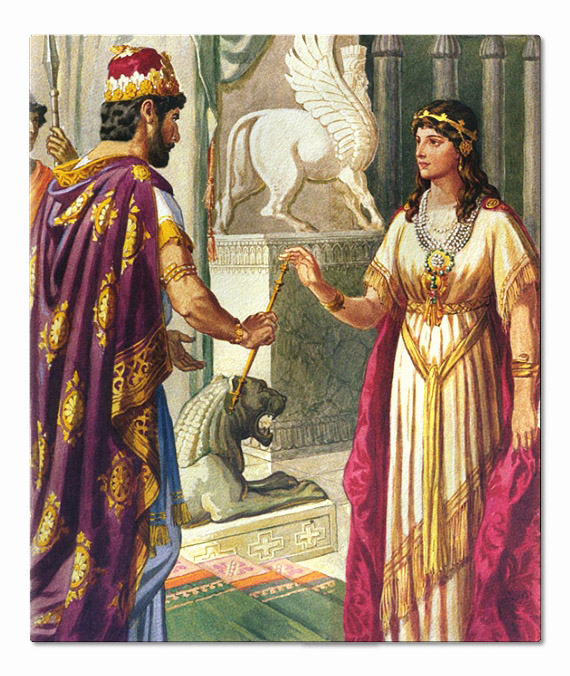
Thursday of the First Week of Lent
The readings for these early days of Lent have been teaching us how to accomplish the various disciplines of Lent – which really are the various disciplines of the spiritual life. Today’s discipline then, I think, would be persistence in prayer. In the first reading, we have Queen Esther, who is really between a rock and a hard place. The king does not know she is Hebrew, and worse than that, if she goes to the king without being summoned, she could well lose her life. But, Mordecai, the man who was her guardian and raised her as his own daughter, revealed to her that the king’s advisor had planned genocide against the Jews, and she was the only person in a position to beg the king to change his mind. So today, she prays that her life, as well as those of her people would be spared. Esther prayed for three days and nights that her prayer would be answered, and her persistence was rewarded. She received the reward that Jesus promised when he said, “Ask and it will be given to you; seek and you will find; knock and the door will be opened to you.”
Which is nice for her and the Israelites, certainly, but how many of us have prayed persistently to God that he would answer our prayer and have yet to be answered? I think most of us at some point or another have experience the exasperation of prayer unanswered, or at least prayer that seems to be unanswered. We can be so frustrated when a loved one is ill or unemployed, or whatever the issue may be, and God seemingly does not hear.
But the discipline of prayerful persistence is not like wishing on a star or anything like that. There’s no magic to our words. We may or may not be rewarded with the exact gift we pray for; in fact, that rarely happens. But we will always be rewarded with the loving presence of our God in our lives. In fact, it could well be that God’s answer to our prayer is “no” – for whatever reason – but even in that “no” we have the grace of a relationship that has been strengthened by our prayerful persistence.
The Psalmist prays, “Lord, on the day I called for help, you answered me.” This Lent, may the discipline of persistence in prayer lead us to a renewed and enlivened sense of the Lord’s will and presence in our lives.
-

Tuesday of the First Week of Lent
The prophet Isaiah and Jesus speak today about the great power of words. Isaiah speaks specifically of the power of God’s word, a word that will not return empty but will go out and accomplish the purpose for which God sent it. We see the word that the prophet speaks of here, of course as the Word – with a capital “W.” That Word is Jesus Christ who comes to accomplish the salvation of the world, the purpose of God ever since the world’s creation.
The prayer that Jesus gives us today, the classic prayer that echoes in our hearts in good times and in bad, is a prayer with a specific purpose in mind. That prayer, if we pray it rightly, recognizes that God’s holiness will bring about a Kingdom where his will will be done in all of creation. It begs God’s forgiveness and begs also that we too would become a forgiving and merciful people, just as God is merciful to us. Finally, it asks for help with temptation and evil, something with which we struggle every day.
Today’s readings are a plea that God’s will would finally be done. That his Word would go forth and accomplish God’s purpose. That his will would be done on earth as in heaven. As we pray those familiar words, they can often go past us without catching our attention. But today, maybe we can slow down just a little, and pray them more reflectively, that God’s will would be accomplished in every place, starting in our very own lives.
Because to God belongs the Kingdom, and the power, and the glory, forever and ever.
-
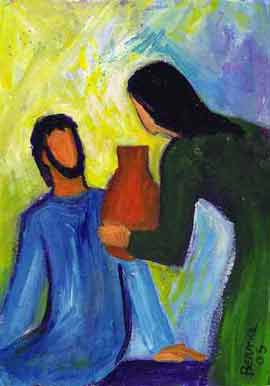
Monday of the First Week of Lent
Be holy, for I, the LORD, your God, am holy.
People often balk at the mere suggestion of being called to personal holiness. Oftentimes, this is wrapped up in a kind of misplaced and false humility; that kind of humility that says that I’m no good; there is no way I can even come close to being like God. Yet the fact of the matter is that we are made good by our Creator God who designed us to be like himself, perfect in holiness.
And if that seems too lofty to attain, Moses and Jesus spell out the steps to getting there today. Clearly, personal holiness is not merely a matter of simply saying the right prayers, fasting at the right times, going to Church every Sunday and reading one’s Bible. Those things are key on the journey to holiness, but using them as a façade betrays a lack of real holiness. Because for both Moses and Jesus, personal holiness, being holy as God is holy, consists of engaging in justice so that hesed – right relationship and right order – can be restored in the world.
All the commands we receive from Moses and Jesus today turn us outward in our pursuit of holiness. Our neighbor is to be treated justly, and that neighbor is every person in our path. Robbery, false words, grudges, withholding charity, rendering judgment without justice, not granting forgiveness and bearing grudges are all stumbling blocks to personal holiness. All of these keep us from being like God who is holy. And worse yet, all of these things keep us from God, period.
The law of the Lord is perfect, as the Psalmist says, and the essence of that law consists of love and justice to every person. If we would strive for holiness this Lent, we need to look to the one God puts in our path, and restore right relationship with that person.
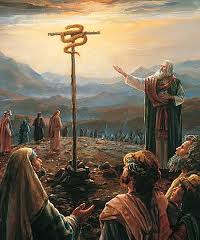
You must be logged in to post a comment.